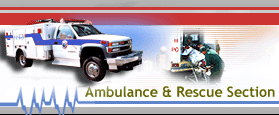|

Depending on the drug taken, the symptoms
the victim shows will vary. However, many drugs will cause drowsiness or may even cause unconsciousness if the victim has
done an overdose. An overdose can occur from taking too many drugs at one time, or taking drugs too frequently.
|
|

Symptoms. Some signs of a drug overdose are vomiting,
restlessness, and lack of coordination. After exhibiting these symptoms, the victim may become unconscious.
If the
victim has taken a single large dose, the symptoms will occur very rapidly. Usually, frequent smaller doses will have symptoms
that appear more gradual over a longer period and may be difficult to notice.
What to do. First aid treatment for a drug overdose is the same no matter what drug was involved. First,
the rescuer must act quickly. The more time is wasted, the more the drug is absorbed in the victim. Never leave the victim
alone. Ask someone to get emergency medical help.
If the victim is conscious, induce vomiting by placing your fingers
down the victim's throat or giving syrup of ipecac. Do not give the victim salt water to drink, as it may be harmful. Do not
induce vomiting if the victim is unconscious, or if the victim has overdosed from injection or inhalation. If the victim is
unconscious place the victim in recovery position (see Putting the Victim in Recover Position under Fainting First Aid for
instructions). The victim should be face down, head to one side in the recovery position.
Closely observe the victim's
breathing and pulse. If the victim stops breathing, give artificial respiration immediately.
If the victim's heart
stops, begin external cardiac compression immediately. If the victim has also stopped breathing and help is unavailable, it
will be necessary for the rescuer to alternate CPR and mouth-to-mouth resuscitation.
If the victim's heart and breathing
has stopped, but help is available, one person should kneel at the victim's shoulder and give CPR Cardiopulmonary Resuscitation.
The other person should begin artificial respiration. The person giving external cardiac compressions should do so at a rate
of 15 times in 11 seconds. Only a trained person should ever perform CPR. The person giving artificial respiration should
do so with two ventilations within 15 seconds. If either becomes fatigued, exchange functions with one another. Remain calm
to keep your breathing regular and to reduce fatigue.

Examples of Symptoms
based on Drug:
Acetaminophen
(Tylenol, Parafon forte): Nausea; vomiting;
pallor; sweating; kidney failure; jaundice; difficulty breathing; delirium; unconsciousness.
Alcohol
(Beer, Wine, Spirits): Mood changes; drowsiness; lack of coordination; rapid pulse; slurred speech; sweating;
vomiting; unconsciousness.
Amphetamines (Benzedrine, Dexedrine, Methedrine): Excitement; pupil dilation; talkativeness; insomnia; tremors; exaggerated reflexes; bad breath; vomiting;
irregular rapid heart rate; hallucinations; delirium; convulsions; unconsciousness.
Antidepressants (tricyclic compounds like Tofranil or
Elavil): Dry mouth; pupil dilation;
vomiting; irregular heart rate; urine retention; hallucinations; lack of coordination; exaggerated reflexes; agitation; convulsions;
hypertension or high blood pressure; unconsciousness.
Antidepressant (MAO inhibiters like Nardil
and Parnate): Agitation; hallucinations;
exaggerated reflexes; irregular heart rate; sweating; rigid muscles; urine retention; convulsions.
Antihistamines (Tripelennamine, Diphenhydramine;
chlorpheniramine, promethazine):
Excitement or depression; drowsiness; headache;
irregular heart rate; nervousness; disorientation; lack of coordination; high fever; hallucination; dilated fixed pupils;
delirium; convulsions; coma.
Caffeine (Coffee, tea, No-Doz, APC): Restlessness; excitement; frequent urination; rapid pulse; nausea; vomiting; fever; tremors; delirium; convulsions;
coma.
Cannabis
(Hashish, marijuana): Sleepiness
Hallucinogens
(LSD, psilocybin, mescaline): Effects
vary between individuals; effects include hallucinations; nausea; lack of coordination. Some may experience anxiety and delusions.
Narcotics (Opium, heroin, morphine, Methadone): Pinpoint pupils; drowsiness; shallow breathing; muscular relaxation; coma; slow pulse;
respiratory arrest.
Salicylates (Aspirin and pain-killers containing aspirin):
Abdominal pain; nausea; vomiting; noises
in the ears; deafness; restlessness; fever; sweating; rapid breathing; irritability; confusion; convulsions; delirium; coma.
|
|

